10 Best Cities for New College Grads
With the economy improving and unemployment declining, the real world is offering new college grads more opportunities than it has in recent years.


Profit and prosper with the best of Kiplinger's advice on investing, taxes, retirement, personal finance and much more. Delivered daily. Enter your email in the box and click Sign Me Up.
You are now subscribed
Your newsletter sign-up was successful
Want to add more newsletters?

Delivered daily
Kiplinger Today
Profit and prosper with the best of Kiplinger's advice on investing, taxes, retirement, personal finance and much more delivered daily. Smart money moves start here.

Sent five days a week
Kiplinger A Step Ahead
Get practical help to make better financial decisions in your everyday life, from spending to savings on top deals.

Delivered daily
Kiplinger Closing Bell
Get today's biggest financial and investing headlines delivered to your inbox every day the U.S. stock market is open.

Sent twice a week
Kiplinger Adviser Intel
Financial pros across the country share best practices and fresh tactics to preserve and grow your wealth.

Delivered weekly
Kiplinger Tax Tips
Trim your federal and state tax bills with practical tax-planning and tax-cutting strategies.

Sent twice a week
Kiplinger Retirement Tips
Your twice-a-week guide to planning and enjoying a financially secure and richly rewarding retirement

Sent bimonthly.
Kiplinger Adviser Angle
Insights for advisers, wealth managers and other financial professionals.

Sent twice a week
Kiplinger Investing Weekly
Your twice-a-week roundup of promising stocks, funds, companies and industries you should consider, ones you should avoid, and why.

Sent weekly for six weeks
Kiplinger Invest for Retirement
Your step-by-step six-part series on how to invest for retirement, from devising a successful strategy to exactly which investments to choose.
With the economy improving and unemployment declining, the real world is offering new college grads more opportunities than it has in recent years. And some places are even more welcoming than others. We identified ten cities that promise members of the class of 2014 the strongest start to their careers.
Because student loans won't pay themselves, we focused on places where recent graduates are likely to land good jobs and take home above-average paychecks. Cities with high unemployment rates, both for the overall population and for people in their twenties, didn’t make the cut.
We also sought out places that are friendly to young adults' budgets, based on average monthly living costs for renters. Some expensive cities still landed on the list because their thriving job markets make up for the higher costs. After all, says Dan Restuccia, of career-research firm Burning Glass Technologies, "you're generally well served to go where the jobs are, though that may mean taking on a more expensive cost of living."
Finally, to ensure that your post-collegiate life won’t be all work and no play, we targeted cities with active social scenes and above-average concentrations of twentysomethings. Take a look at 2014’s best cities for new college grads.
Population data is from the U.S. Census Bureau's 2012 American Community Survey. Payscale, a compensation-research firm, provided the median salaries of bachelor's-degree holders with up to three years of work experience in the nation's 200 largest metro areas. Living costs are from the Council for Community and Economic Research. Job-posting data is from Burning Glass Technologies, a job-market research firm. April 2014 unemployment rates for metropolitan areas, from the U.S. Bureau of Labor Statistics, are not seasonally adjusted.

10. Dallas
- Metro population: 6.4 million
- Share of population in their twenties: 14.2% (U.S.: 13.8%)
- Median salary for recent college grads: $45,300 a year (for top 200 metro areas in U.S.: $42,800)
- Cost of living for renters: 2.6% above national average
- Entry-level job postings: 966 per 10,000 twentysomethings (U.S.: 796 per 10,000)
Including the folks in neighboring Fort Worth and Arlington, the Dallas metro area ranks as the most populous on this list, with the greatest number of twentysomethings. One reason for its popularity: the friendly job market. "Dallas's economy has been growing very rapidly," says Restuccia, of Burning Glass Technologies. "But the existing workforce has a lower educational attainment level than you'll find in, say, Boston, New York or Seattle, so it's a place that offers a lot of opportunities for new graduates."
Indeed, the area's low unemployment rate of 4.7%, compared with the nation's 5.9% as of April 2014, indicates less competition for jobs. Top private employers include American Airlines, headquartered in Fort Worth, and AT&T and Texas Instruments, both based in Dallas.
Area costs are friendly, too. While monthly expenses for renters are slightly above average, overall living costs are about 4% below the national average. Apartment rents are particularly affordable: The average rent for a two-bedroom, two-bathroom unit is the lowest on this list at $818 a month, compared with the U.S. average of $893.
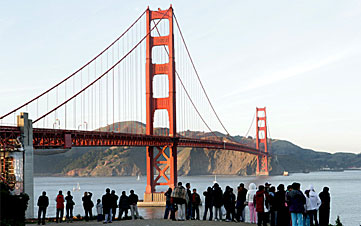
9. San Francisco
- Metro population: 4.4 million
- Share of population in their twenties: 14.0%
- Median salary for recent college grads: $51,600 a year
- Cost of living for renters: 33.9% above national averageEntry-level job postings: 1,085 per 10,000 twentysomethings
New grads looking to break into the technology field must consider settling in San Francisco. Software developers are in particularly high demand in the Bay Area, with nearly 40,000 job postings seeking their skills over the past year. Especially if you're a budding entrepreneur, this great city to start a business has a lot to offer: San Francisco attracted $3.2 billion in investment funds in the first quarter of 2014, nearly double the venture capital accumulated in San Jose, the heart of Silicon Valley.
Even without your own next-big-start-up idea, you're likely to bring in big bucks. Entry-level grads typically earn 20.6% more than the U.S. median.
But be warned: The biggest paychecks on this list will have to cover the highest living costs. Not that you can't find many budget-friendly ways to enjoy this fun-filled city. Each week, for example, SF.FunCheap.com recommends at least 50 free or affordable events around town, such as film and food festivals, walking tours, art shows, and even the occasional free dog wash weekend. Also note: New grads hoping for a more mature scene will be pleased with the area's median age of 38.3, slightly older than the U.S. median of 37.2 and the most seasoned on this list.
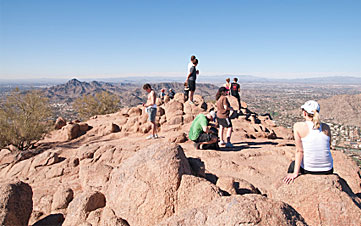
8. Phoenix
- Metro population: 4.2 million
- Share of population in their twenties: 14.3%
- Median salary for recent college grads: $43,100 a year
- Cost of living for renters: 4.0% below national average
- Entry-level job postings: 1,074 per 10,000 twentysomethings
Not just a community of golfers and retirees, Phoenix attracts a younger crowd, too. The area's median age is a young 34.8, compared with 37.2 for the U.S. One reason young people are likely drawn to Arizona's capital is the job market. Of the nearly 240,000 online postings for jobs in Phoenix over the past year, 27% were for entry-level positions (versus 23% for all U.S. job postings), tied for the highest share on this list. Major employers in the area include Banner Health, defense contractor Raytheon and Arizona State University.
Another attractive quality of the area is its affordability. Phoenix offers renters the lowest living costs of all the cities on this list. In fact, the average two-bedroom, two-bathroom apartment rents for just $843 a month, compared with $893 for the U.S. Despite these below-average costs, you're still likely to enjoy an above-average starting salary, leaving plenty of room in your budget for fun in the Valley of the Sun. Not that you'll need it. Phoenix's natural beauties, including 180 miles of desert trails that you can explore by foot, horse or bike, are free.
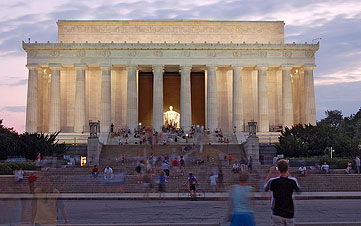
7. Washington, D.C.
- Metro population: 5.6 million
- Share of population in their twenties: 14.4%
- Median salary for recent college grads: $47,600 a year
- Cost of living for renters: 13.8% above national average
- Entry-level job postings: 1,066 per 10,000 twentysomethings
- The District's low unemployment rate is anchored by Uncle Sam (4.5% as of April 2014, compared with 5.9% for the U.S.). But people in the private sector can launch their careers in the capital, too. The aerospace, technology and health care industries are all well represented and provide a broad range of high-paying jobs. Major nongovernment employers include defense contractor Northrop Grumman, consulting firm Booz Allen Hamilton, Coventry Health Care and Marriott International.
Be ready to devote a fat chunk of those big paychecks to living costs. D.C. is one of the country's most expensive cities to live in and charges the second-highest average apartment rent of all the cities on this list: a hefty $1,961 a month, compared with $893 for the U.S. But at least you can save on your entertainment budget; you won't need to spend a cent on many local attractions, such as the monuments, most of the museums and the National Zoo.
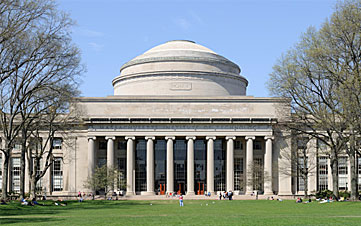
6. Boston
- Metro population: 4.6 million
- Share of population in their twenties: 14.5%
- Median salary for recent college grads: $46,500 a year
- Cost of living for renters: 32.9% above national average
- Entry-level job postings: 1,064 per 10,000 twentysomethings
Home to many renowned universities, Boston offers a healthy job market that encourages local grads to stay and new folks to come. The recent unemployment rate was just 5.0% and is projected to get even better, with a large number of new openings posted over the past year. Grads hoping to get into the science, technology, engineering or math (STEM) fields will find particularly good prospects. "Boston has one of the highest concentrations of STEM jobs in the country," says job-market analyst Restuccia. "The universities support a strong start-up culture in technology, as well as a number of health care industry employers."
The high local starting salaries can help you manage costs in one of the most expensive U.S. cities to live in. But you still need to brace your budget: The average rent for a two-bedroom, two-bathroom apartment in Boston is $1,863 a month, compared with a national average of $893. (Consider finding a roommate to split that cost.)
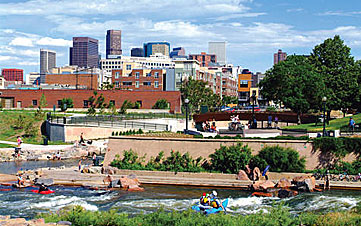
5. Denver
- Metro population: 2.6 million
- Share of population in their twenties: 14.1%
- Median salary for recent college grads: $44,400 a year
- Cost of living for renters: 1.1% above national average
- Entry-level job postings: 1,633 per 10,000 twentysomethings
The Mile High City offers an expanding job market for new grads. The unemployment rate for workers in their twenties is 9.7%, three percentage points better than the U.S. rate, and the number of entry-level job postings per 10,000 twentysomethings is the highest of all the cities on this list. The federal, state and local governments are among the top employers in the area. But the city's small businesses (with five to 100 employees) make a big impact as well, employing 44% of the local workforce.
Living costs for renters are slightly above average. But starting paychecks that are about 3.7% more than the national median help cover the spread. Plus, it's free to enjoy the beautiful scenery and many days of sunshine.
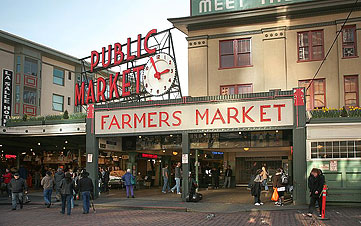
4. Seattle
- Metro population: 3.5 million
- Share of population in their twenties: 14.7%
- Median salary for recent college grads: $46,600 a year
- Cost of living for renters: 18.3% above national average
- Entry-level job postings: 1,090 per 10,000 twentysomethings
Looking to get into the tech industry but can't afford the high living costs of Silicon Valley? Consider the Seattle area, where Amazon and Microsoft are headquartered and overall living costs are 30.2% and 42.5% lower than in San Jose and San Francisco, respectively. You can save even more by living about 30 miles north in Everett, Wash., where the average apartment rents for just $1,200 a month, compared with $1,643 a month in Seattle.
Beside tech, major industries include health care, clean technology and aerospace, led by Boeing. The University of Washington is another big local employer, the largest in the city proper. And if existing companies don't interest you, start your own. Seattle is one of our 10 Great Cities to Start a Business.

3. Salt Lake City
- Metro population: 1.1 million
- Share of population in their twenties: 16.1%
- Median salary for recent college grads: $43,600 a year
- Cost of living for renters: 3.8% below national average
- Entry-level job postings: 1,046 per 10,000 twentysomethings
- Low living costs and high pay make this an excellent starting-out city. The average apartment rent, at just $846 a month ($50 less than the national average), will put a relatively small dent in an above-average beginning salary. No wonder the local crowd is so young; the median age in the metro area is 30.9, compared with 37.2 for the U.S.
- Low unemployment adds to the area's appeal. At 3.1%, the overall rate is the lowest on this list and far below the nation's 5.9%, as of April 2014. Local twentysomethings are equally fortunate, with just 8.8% out of work, compared with 12.7% of Americans in their twenties. And 27% of all the job openings posted online over the past year were in search of entry-level workers (compared with 23% for all U.S. job postings), tied for the highest share on this list. Top employers include the University of Utah, along with its hospital, and Delta Air Lines.

2. Anchorage, Alaska
- Metro population: 380,789
- Share of population in their twenties: 16.0%
- Median salary for recent college grads: $50,100 a year
- Cost of living for renters: 19.4% above national average
- Entry-level job postings: 1,150 per 10,000 twentysomethings
Anchorage may be one of the pricier and more remote cities on this list, but its college grads are also among the best paid. The median starting salary for sheepskin holders is the second-highest of all our best cities for new grads. Plus, you won't have to pay state income or sales taxes, and you'll collect an annual dividend -- which was $900 in 2013 -- from Alaska's oil fund, if you live there the full year.
The local economy has grown steadily, adding more than 7,000 jobs since the recession, and that number should continue to rise. The number of entry-level job postings per 10,000 twentysomethings is the third-highest of all the cities on this list. Leading industries in the area include health care, hospitality, business services (ranging from legal to scientific to engineering work), transportation and, of course, oil and gas—all fields that are expected to add jobs this year, according to the Anchorage Economic Development Corporation.

1. Boulder, Colo.
- Metro population: 297,218
- Share of population in their twenties: 17.1%
- Median salary for recent college grads: $44,200 a year
- Cost of living for renters: 8.5% above national average
- Entry-level job postings: 1,321 per 10,000 twentysomethings
This Colorado mountain town is tops for new grads and is especially well-suited for the crowd-averse. With the smallest population of all the cities on this list, Boulder offers intimacy without sacrificing opportunities. In fact, the unemployment rate is a favorable 4.2%, as of April 2014, compared with 5.9% for the U.S. And over the past year, the city posted the second-greatest number of entry-level job opening per 10,000 twentysomethings on this list. Major employers include the University of Colorado Boulder, IBM and Ball Aerospace.
Boulder has plenty to offer outside of work, too. At the foot of the Rocky Mountains, you can enjoy plenty of hiking, climbing and biking. For not-quite-so-active activities, downtown Boulder's Pearl Street Mall includes about 1,000 businesses, 85% of which are owned and operated by locals (offering plenty of date venues for the many singles in the area).

2013's Best Cities for New Grads
1. Salt Lake City
2. Ann Arbor, Mich.
3. Boulder, Colo.
4. Houston
5. Anchorage, Alaska
6. San Diego
7. Phoenix
8. Washington, D.C.
9. Dallas
10. Seattle
Kiplinger updates many of its "best" rankings annually. Above is last year's list of 10 Best Cities for New Grads. Keep in mind that ranking methodologies can change from year to year based on the data available at the time, differences in how the data was gathered, changes in data providers and tweaks to the formulas used to narrow the pool of candidates.

Profit and prosper with the best of Kiplinger's advice on investing, taxes, retirement, personal finance and much more. Delivered daily. Enter your email in the box and click Sign Me Up.

Rapacon joined Kiplinger in October 2007 as a reporter with Kiplinger's Personal Finance magazine and became an online editor for Kiplinger.com in June 2010. She previously served as editor of the "Starting Out" column, focusing on personal finance advice for people in their twenties and thirties.
Before joining Kiplinger, Rapacon worked as a senior research associate at b2b publishing house Judy Diamond Associates. She holds a B.A. degree in English from the George Washington University.
-
 Nasdaq Leads a Rocky Risk-On Rally: Stock Market Today
Nasdaq Leads a Rocky Risk-On Rally: Stock Market TodayAnother worrying bout of late-session weakness couldn't take down the main equity indexes on Wednesday.
-
 Quiz: Do You Know How to Avoid the "Medigap Trap?"
Quiz: Do You Know How to Avoid the "Medigap Trap?"Quiz Test your basic knowledge of the "Medigap Trap" in our quick quiz.
-
 5 Top Tax-Efficient Mutual Funds for Smarter Investing
5 Top Tax-Efficient Mutual Funds for Smarter InvestingMutual funds are many things, but "tax-friendly" usually isn't one of them. These are the exceptions.
-
 What to Do With Your Tax Refund: 6 Ways to Bring Growth
What to Do With Your Tax Refund: 6 Ways to Bring GrowthUse your 2024 tax refund to boost short-term or long-term financial goals by putting it in one of these six places.
-
 What Does Medicare Not Cover? Eight Things You Should Know
What Does Medicare Not Cover? Eight Things You Should KnowMedicare Part A and Part B leave gaps in your healthcare coverage. But Medicare Advantage has problems, too.
-
 12 Great Places to Retire in the Midwest
12 Great Places to Retire in the MidwestPlaces to live Here are our retirement picks in the 12 midwestern states.
-
 15 Cheapest Small Towns to Live In
15 Cheapest Small Towns to Live InThe cheapest small towns might not be for everyone, but their charms can make them the best places to live for plenty of folks.
-
 Best Cold Weather Places to Retire
Best Cold Weather Places to RetirePlaces to live Some like it hot; others, not so much. Here are the 12 best places to retire if you can't stand the heat.
-
 15 Reasons You'll Regret an RV in Retirement
15 Reasons You'll Regret an RV in RetirementMaking Your Money Last Here's why you might regret an RV in retirement. RV-savvy retirees talk about the downsides of spending retirement in a motorhome, travel trailer, fifth wheel, or other recreational vehicle.
-
 The 24 Cheapest Places To Retire in the US
The 24 Cheapest Places To Retire in the USWhen you're trying to balance a fixed income with an enjoyable retirement, the cost of living is a crucial factor to consider. Is your city the best?
-
 The Six Best Places to Retire in New England
The Six Best Places to Retire in New Englandplaces to live Thinking about a move to New England for retirement? Here are the best places to land for quality of life, affordability and other criteria.
